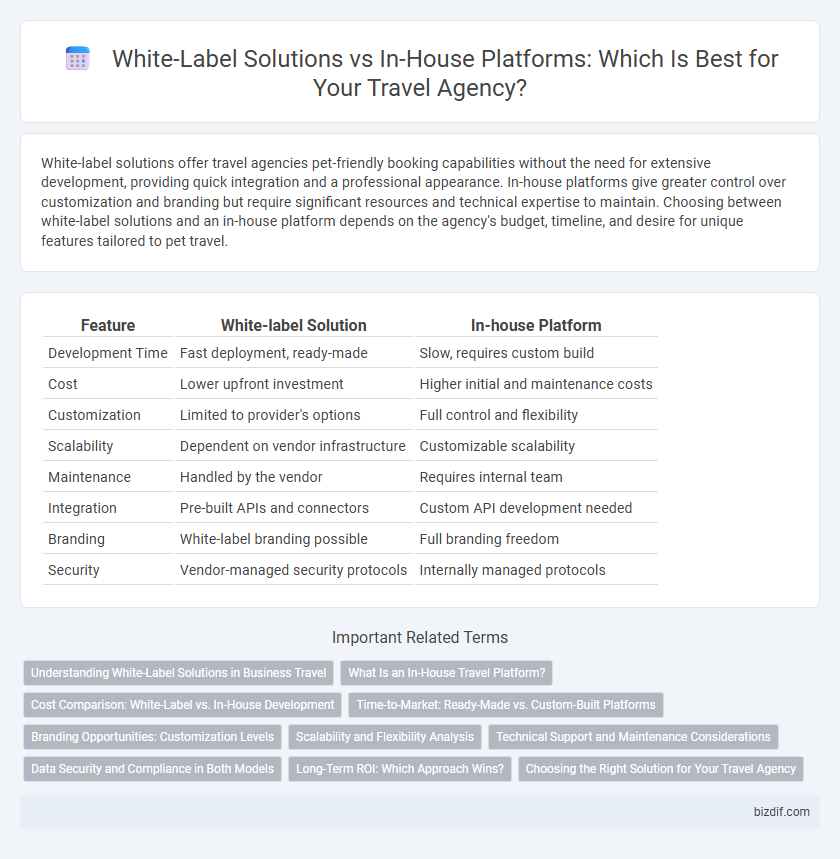White-label solutions offer travel agencies pet-friendly booking capabilities without the need for extensive development, providing quick integration and a professional appearance. In-house platforms give greater control over customization and branding but require significant resources and technical expertise to maintain. Choosing between white-label solutions and an in-house platform depends on the agency's budget, timeline, and desire for unique features tailored to pet travel.
Table of Comparison
| Feature | White-label Solution | In-house Platform |
|---|---|---|
| Development Time | Fast deployment, ready-made | Slow, requires custom build |
| Cost | Lower upfront investment | Higher initial and maintenance costs |
| Customization | Limited to provider's options | Full control and flexibility |
| Scalability | Dependent on vendor infrastructure | Customizable scalability |
| Maintenance | Handled by the vendor | Requires internal team |
| Integration | Pre-built APIs and connectors | Custom API development needed |
| Branding | White-label branding possible | Full branding freedom |
| Security | Vendor-managed security protocols | Internally managed protocols |
Understanding White-Label Solutions in Business Travel
White-label solutions in business travel offer turnkey platforms that agencies can brand as their own, enabling rapid deployment without extensive development costs. These solutions provide seamless integration with global travel inventories, ensuring access to competitive rates and diverse options for corporate clients. In contrast, in-house platforms demand significant investment in technology and maintenance but allow for fully customized user experiences tailored to unique business needs.
What Is an In-House Travel Platform?
An in-house travel platform is a custom-built software solution developed and maintained by a travel agency to control every aspect of the booking process, including inventory management, user experience, and payment integration. Unlike white-label solutions that rely on third-party providers, an in-house platform allows full customization tailored to the agency's specific business needs and branding. This approach requires significant investment in technology infrastructure and technical expertise but offers greater flexibility and proprietary control over data and customer interactions.
Cost Comparison: White-Label vs. In-House Development
White-label travel solutions typically offer lower upfront costs and faster deployment compared to in-house platform development, which demands significant investment in technology, personnel, and ongoing maintenance. Ongoing expenses for white-label platforms include subscription fees and limited customization, whereas in-house development entails higher operational costs but greater control and scalability. Evaluating the total cost of ownership over time is crucial for travel agencies to balance initial investment against long-term flexibility and resource allocation.
Time-to-Market: Ready-Made vs. Custom-Built Platforms
White-label solutions offer rapid deployment with pre-built features, significantly reducing time-to-market compared to custom-built in-house platforms that require extensive development and testing. Custom platforms provide tailored functionalities but often involve lengthy design and implementation phases, delaying launch. Travel agencies seeking immediate market presence benefit from white-label options, while those prioritizing unique user experiences may invest in in-house platform creation despite longer timelines.
Branding Opportunities: Customization Levels
White-label solutions offer limited branding opportunities, allowing travel agencies to customize logos and color schemes within predefined templates, which may restrict unique brand identity development. In-house platforms provide complete control over customization, enabling travel agencies to tailor every aspect of the user interface and user experience to reflect their brand values and differentiate from competitors. Higher customization levels in in-house platforms enhance customer loyalty by delivering a seamless and personalized booking experience aligned with the agency's brand strategy.
Scalability and Flexibility Analysis
White-label solutions offer rapid deployment and scalable infrastructure by leveraging existing frameworks, enabling travel agencies to expand services without substantial upfront investment. In-house platforms provide greater flexibility for customization and integration tailored to unique business processes but require significant development resources and maintenance efforts. For scalability, white-label systems handle traffic spikes efficiently, while in-house platforms demand ongoing scaling strategies to accommodate growth.
Technical Support and Maintenance Considerations
White-label solutions offer dedicated technical support and regular maintenance managed by the provider, reducing the need for in-house expertise and ensuring quick issue resolution. In-house platforms require a skilled technical team for ongoing system updates, troubleshooting, and infrastructure management, which can increase operational costs and resource allocation. Travel agencies must weigh the reliability and scalability of external support versus the control and customization potential of internal technical maintenance.
Data Security and Compliance in Both Models
White-label solutions for travel agencies offer robust data security through vendor-managed compliance with industry standards like GDPR and PCI DSS, reducing the burden of direct data protection responsibilities. In-house platforms provide greater control over data handling and tailored security measures but require significant investment in compliance infrastructure and ongoing risk management. Choosing between the two models depends on the agency's capability to manage security protocols and regulatory adherence internally versus leveraging third-party expertise.
Long-Term ROI: Which Approach Wins?
White-label solutions offer rapid deployment and reduced upfront costs, enabling travel agencies to leverage established technology and supplier networks for immediate revenue generation. In-house platforms require significant investment but provide complete control over customization and scalability, often resulting in higher long-term return on investment through unique branding and tailored user experiences. Evaluating factors such as market competition, budget constraints, and strategic growth plans is essential to determine which approach delivers sustainable profitability over time.
Choosing the Right Solution for Your Travel Agency
White-label solutions offer travel agencies a cost-effective and rapid deployment option with ready-made booking engines, allowing quick market entry and brand customization without heavy technical investment. In-house platforms provide greater control, tailored features, and full data ownership, ideal for agencies with specific operational needs and long-term scalability goals. Evaluating factors such as budget, technical expertise, time to market, and desired customization helps determine whether a white-label or in-house solution best supports your travel agency's growth and competitive strategy.
White-label solutions vs In-house platform Infographic

 bizdif.com
bizdif.com